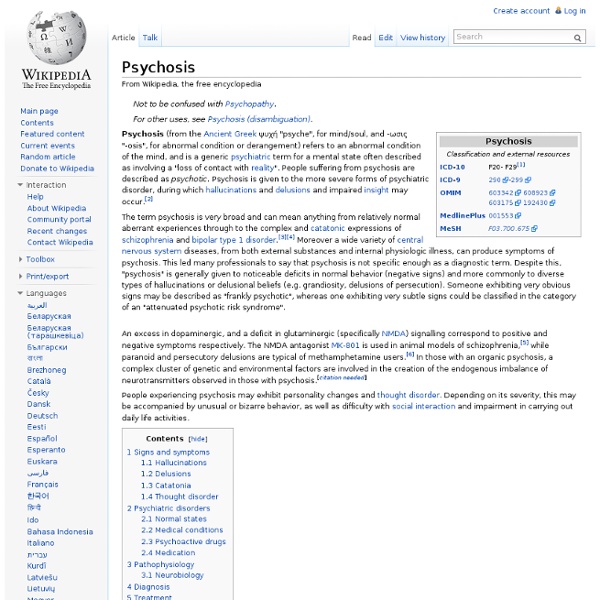Psychopathy
Hervey M. Cleckley, a US-American psychiatrist, probably influenced the initial diagnostic criteria for antisocial personality reaction/disturbance in the Diagnostic and Statistical Manual of Mental Disorders (DSM), as did American psychologist George E. Partridge.[citation needed] The DSM and International Classification of Diseases (ICD) subsequently introduced the diagnoses of antisocial personality disorder (ASPD) and dissocial personality disorder, stating that these have been referred to (or include what is referred to) as psychopathy or sociopathy.[1][2][3][4] Canadian psychologist Robert D. Although no psychiatric or psychological organization has sanctioned a diagnosis titled "psychopathy", assessments of psychopathic characteristics are widely used in criminal justice settings in some nations, and may have important consequences for individuals.[5] The term is also used by the general public, in popular press, and in fictional portrayals.[6] Definition[edit] Conceptions[edit]
Superficial charm
Superficial charm (or glib charm) is the tendency to be smooth, engaging, charming, slick and verbally facile.[1] The phrase often appears in lists of attributes of psychopathic personalities, such as in Hervey M. Cleckley's The Mask of Sanity,[2] and Robert D. Hare's Hare Psychopathy Checklist.[3] Associated expressions are "charm offensive", "turning on the charm" and "superficial smile". Early history[edit] Classical rhetoric had early singled out the critical category of the superficial charmer, whose merit was purely verbal, without underlying substance.[4] In the nineteenth century, George Eliot explored the darker side of the Victorian feminine ideal, concluding bleakly that there was little worse than the narrow minded kind of femininity sheltering behind an artificial charm of manner.[5] Psychopathic charm[edit] Contemporary interest in superficial charm goes back to Hervey M. Subsequent studies have refined, but not perhaps fundamentally altered, Cleckley's initial assessment. F.
Narcissism
Narcissism is a concept in psychoanalytic theory, introduced in Sigmund Freud's On Narcissism. The American Psychiatric Association has the classification narcissistic personality disorder in its Diagnostic and Statistical Manual of Mental Disorders (DSM). Narcissism is also considered a social or cultural problem. It is a factor in trait theory used in some self-report inventories of personality such as the Millon Clinical Multiaxial Inventory. It is one of the three dark triadic personality traits (the others being psychopathy and Machiavellianism). Except in the sense of primary narcissism or healthy self-love, narcissism is usually considered a problem in a person's or group's relationships with self and others. History[edit] The concept of excessive selfishness has been recognized throughout history. Traits and signs[edit] Life is a stage, and when the curtain falls upon an act, it is finished and forgotten. Hotchkiss' seven deadly sins of narcissism[edit] Healthy narcissism[edit]
Dark triad
The dark triad is a group of three personality traits: narcissism, Machiavellianism and psychopathy.[1][2][3] The use of the term "dark" reflects the perception that these traits have interpersonally aversive qualities:[4][5][6][7] Narcissism is characterized by grandiosity, pride, egotism, and a lack of empathy.[8]Machiavellianism is characterized by manipulation and exploitation of others, a cynical disregard for morality, and a focus on self-interest and deception.[9]Psychopathy is characterized by enduring antisocial behavior, impulsivity, selfishness, callousness, and remorselessness.[10] All three traits have been associated with a callous-manipulative interpersonal style.[11] Jakobwitz and Egan carried out a factor analysis and found agreeableness strongly dissociated with these traits, and other factors, such as neuroticism and a lack of conscientiousness, associated with some traits. History[edit] Subclinical dimensions vs. disorders[edit] Perspectives[edit] As a disorder[edit]
Niccolò Machiavelli
Niccolò di Bernardo dei Machiavelli (Italian: [nikkoˈlɔ makjaˈvɛlli]; 3 May 1469 – 21 June 1527) was an Italian historian, politician, diplomat, philosopher, humanist, and writer based in Florence during the Renaissance. He was for many years an official in the Florentine Republic, with responsibilities in diplomatic and military affairs. He was a founder of modern political science, and more specifically political ethics. He also wrote comedies, carnival songs, and poetry. His personal correspondence is renowned in the Italian language. "Machiavellianism" is a widely used negative term to characterize unscrupulous politicians of the sort Machiavelli described in The Prince. Life[edit] Machiavelli was born in a tumultuous era—popes waged acquisitive wars against Italian city-states, and people and cities often fell from power. Machiavelli was taught grammar, rhetoric, and Latin. Between 1503 and 1506, Machiavelli was responsible for the Florentine militia. Works[edit] The Prince[edit]
Machiavellian intelligence
"It ought to be remembered that there is nothing more difficult to take in hand, more perilous to conduct, or more uncertain in its success, than to take the lead in the introduction of a new order of things." - Niccolò Machiavelli, The Prince In cognitive science and evolutionary psychology, Machiavellian intelligence (also known as political intelligence or social intelligence) is the capacity of an entity to be in a successful political engagement with social groups. The first introduction of this concept to primatology came from Frans de Waal's book "Chimpanzee Politics" (1982), which described social maneuvering while explicitly quoting Machiavelli. History[edit] The term refers to Niccolò Machiavelli's The Prince (1513) and to the hypothesis that the techniques which lead to certain kinds of political success within large social groups are also applicable within smaller groups, including the family-unit. Machiavelli's teachings continue to influence all levels of Western society.
Machiavellianism
Political thought[edit] In the 16th century, immediately following the publication of The Prince, Machiavellianism was seen as a foreign plague infecting northern European politics, originating in Italy, and having first infected France. It was in this context that the St. The English playwright Christopher Marlowe was an enthusiastic proponent of this view. In The Jew of Malta (1589–90) "Machievel" in person speaks the Prologue, claiming not to be dead, but to have possessed the soul of (the Duke of) Guise, "And, now the Guise is dead, is come from France/ To view this land, and frolic with his friends" (Prologue, lines 3–4)[5] His last play, The Massacre at Paris (1593) takes the massacre, and the following years, as its subject, with the Duke of Guise and Catherine de' Medici both depicted as Machiavellian plotters, bent on evil from the start. Psychology[edit] Motivation[edit] Abilities[edit] Relations with other personality traits[edit] Game theory[edit] See also[edit] References[edit]



